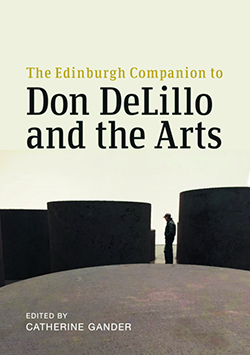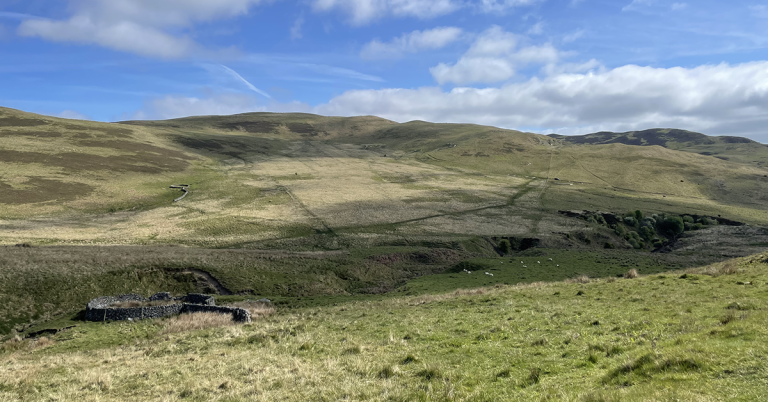
by Catherine Gander
Tell us a bit about your book.
The Edinburgh Companion to Don DeLillo and the Arts brings together 31 excellent international scholars. It’s the first book to comprehensively explore DeLillo’s life-long engagement with the arts – visual, media and digital, literary, performing, plastic, and spatial. While there is a good deal of scholarship on DeLillo and visual art, particularly painting and video art, there has never been such a wide-ranging project of sustained and focused analysis. DeLillo studies can be quite a white, male-dominated field; my intention from the start was to ensure the Companion contained a gender-balanced group of critical voices from across the world, established, and emerging.
On a more personal note, this is a book that is close to my heart. I began the Companion while I was on maternity leave; I assembled and edited it and wrote my own pieces for it during the very worst months – years – of the Covid pandemic, often while my then pre-school child was at home, and we were under lockdown conditions. As I note in the Acknowledgments, I was bowled over by the brilliance, kindness, and professionalism of the book’s contributors, who were also facing a variety of Covid-related troubles.
What inspired you to research in this area?
I have a background in art and photography, and during my time as an Americanist student at King’s College London, I took delight in combining the study of literature with the study of visual cultures. John Berger’s work, particularly Ways of Seeing, radically affected my own perspectives on the intersections of the social, political, and aesthetic, as did the cross-genre genius of Muriel Rukeyser, on whom I wrote my doctoral thesis and first book (also with EUP). At King’s, I also discovered the fiction of DeLillo. DeLillo is an author whose interest in the arts closely overlap my own, and one of the only authors I know of whose body of work has maintained a profound relation to other forms of art, always prompting us to attend closely not just to the particulars of everyday life, but to the ways in which our very vision is directed by the apparatus of power.
DeLillo’s fictions often have a painterly aesthetic; whether through artistic mise-en-abymes or ekphrastic renderings, they explore our attitudes toward visual and literary cultures and toward each other, often by demonstrating the ways in which those attitudes are shaped by a spectacle-saturated world. But DeLillo has a poet’s eye, too: an ability to see and condense meaning into an object, a look, a gesture, via both an economy of language and a recognition of its capacity to exceed the containments of its forms. I wanted to know more about the myriad ways DeLillo engages with art forms, aesthetics, styles, and genres. In short, I put together the book I really, really wanted to read, and I was lucky that so many of my dream contributors were able to join the project.
What was the most exciting thing about this project for you?
In terms of editing, by far the most exciting thing about this project was the privilege of receiving such thoughtful, brilliant pieces of work from my colleagues, and seeing the wonderful ways the essays talked to each other across the pages of the book. Editing this Companion was a real pleasure.
In terms of researching, I’ve found DeLillo’s papers in the Harry Ransom Center to be a treasure trove of insights into the working practices of the author. One of my favourite aspects of DeLillo’s archives are the collections of loose-leaf notes – tiny oblongs of paper no bigger than 4×3 inches, on which he has hand-written fragments of thoughts, images, ideas, quotations. Being able to spend time with them is like sitting among broken pieces of Zen Koans. They keep you thinking long after you have returned the folder to its archival box and left the building.
In terms of the project’s final stages, I’ve been enjoying the emails and social media posts from contributors as their copies arrive in the post, but one message particularly hit home. A professor emerita whose work I admire greatly wrote: “It was a pleasure to work with you. You always managed to seem so fully engaged with DeLillo and the massive bibliography that has accumulated around his work, while never ceasing to seem like an actual human being with childcare problems!”
The scholarship is always important… but the pandemic provided a stark reminder of the human lives behind the work. I found, as I was completing this book (and both my husband and child were isolating in different rooms in our Covid-ridden household) that the work of care was deeply interlaced with the work of the book, and that the art of criticism, of reading, of writing, are caught up in the art of surviving.
About the book

Get 30% off with discount code NEW30
The first book to comprehensively address Don DeLillo’s deep and lasting engagement with the arts across the entirety of his writing career
The Edinburgh Companion to Don DeLillo and the Arts is a genuine intervention in DeLillo scholarship by offering an interdisciplinary examination of his work across forms, media, method, and theory.
Don’t forget to sign up to our mailing list to keep up to date with all of our free content and latest releases!
About the author

Catherine Gander is editor of The Edinburgh Companion to Don DeLillo and the Arts (Edinburgh UP, 2023), author of Muriel Rukeyser and Documentary: The Poetics of Connection (Edinburgh UP, 2013, winner of the IAAS Book Prize for Best Book in American Studies), and co-editor with Sarah Garland of Mixed Messages: American Correspondences in Visual and Verbal Practices (2016). She was the 2023 recipient of the triennial IAWIS Max Nänny Prize for Best Essay in Word and Image studies. Her current projects are Extending the Document: Contemporary Transmedial Poetics, and Beyond Ourselves: Contemporary Poets on Muriel Rukeyser. She is Associate Professor of American Literature at Maynooth University, Ireland, and Chair of the Irish Association for American Studies.





